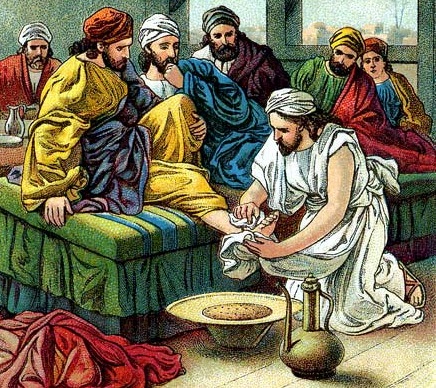June 11, 2018.
What an amazing scene! Jesus, Creator of the universe, removes His outer garments, takes water in a basin, and washes the feet of His twelve apostles. All of this “knowing… that He came forth from God, and was going to God.” He also knows that two feet He washes belong to one who will betray Him. Two other feet belong to one who will deny Him. All twenty-four feet belong to those who have been arguing about which one of them is the greatest. Knowing all things, Jesus washes their feet. What an amazing scene of humility and love! (John 13:1-17)
What are we to take away from this vivid scene? What does it all mean for us? How do we apply this to our lives? Are we to reenact this scene once a year? Or is it to be done every time we partake of the Lord’s Supper? Is one person supposed to wash the feet of twelve people while the rest observe? Or is everyone supposed to wash at least one person’s feet and have his/her feet washed at least once? Is one foot per person to be washed, or both feet? Churches reenact the scene in various ways. Which way is right?
Dirty Feet
A good place to start is to ask what kind of feet Jesus washed (John 13:1-17). Peter helps us get the true picture. When Jesus came to him, he blurted out, “You will never wash my feet!” Jesus replied, “If I don’t wash you, you have no part with me.” Well now, that was too much for Peter to take, so he responded, “Lord, not my feet only, but also my hands and my head!” Yes, Peter was outspoken and sometimes stuck his foot in his mouth. but there can be no doubt that he loved his Master.
And his Master explained, “Someone who has bathed only needs to have his feet washed.” That makes no sense in modern society, but it made perfect sense then and there. Feet washing was as old as the book of Genesis where it is referred to on four occasions: 18:4; 19:2; 24:32; and 43:24. We all know why. No concrete, no asphalt, no shoes, no socks. Rather, people often went with sandals, or even barefoot, on dusty roads. Result? Dirty feet when they arrived at their destination. That’s why Jesus said, “Someone who has bathed only needs to have his feet washed.” In other words, Jesus is clarifying for Peter (and us) that He is washing only feet, because that is all that is dirty.
I came across a website discussing “How to Conduct a Foot-Washing Service.” The first specific instruction was “Instruct them to come to the service with clean feet in clean footgear.” It is my guess that, with or without written instructions, this is exactly what happens in most, if not all, foot-washing services today. Surely, you shouldn’t come with smelly feet, much less with really dirty feet. But this misses the whole point. Jesus did something physically useful. Something a servant would often do. He wasn’t playacting. He was washing dirty feet.
Example
Someone will tell us that on that occasion Jesus commanded us to “do as I have done.” Yes, and what did Jesus mean by that? Let’s consider the case of the Good Samaritan. Jesus told the lawyer, “Go and do likewise” (Luke 10:37). I have never heard anyone suggest that being a Good Samaritan is only fulfilled when I find someone who has been robbed, left naked, and is dying. Of course not. Much less am I a good Samaritan by acting out a skit. We all understand that Jesus was teaching the principle of showing mercy, acting as a neighbor to whoever is in need.
In the case of washing feet, we have more than “do as I have done.” Immediately preceding those words, Jesus said, “I have given you an example.” He did not say, “I have given you an ordinance,” or “I have given you a commandment.” Rather, “I have given you an example… do as I have done.” An example is not a specific thing to be repeated; rather, it portrays the type of thing to be done. Remember your math teacher giving an example? When the test came, did you make a copy of the example to answer every problem? If you did, you failed. If I wash someone’s clean feet, I have not done what Jesus did, nor have I understood the example. The example in this case is one of humble, loving, useful service.
By washing dirty feet, Jesus gave us an example of serving one another, even in very humble ways. Jesus did something helpful, something useful, something needed. Years later, Peter reminds us that “Christ also suffered for us, leaving you an example, that you should follow His steps… who His own self bore our sins in His body on the tree” (1 Peter 2:21-24). Should we follow His steps as some in the Philippines do every Easter? Some men are literally nailed to crosses! “Absurd,” you say? Absolutely. We all understand that that is not the way to “follow His steps.” Reenacting episodes of Jesus’ life is not what it is all about.
We don’t follow Jesus’ steps by flying to the “holy land” to physically walk where Jesus walked. We don’t follow Jesus’ example by “washing” clean feet. “The Son of Man came not to be served, but to serve” (Matt. 20:28). We follow Jesus’ example when we serve one another in useful ways. Let’s do it.
